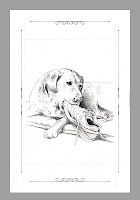 |
| Photo Courtesy of Claire Clayton |
There are also people who have a few dollars to spare and want to know which animal related charity is the "best"place for their hard-earned dollars. Many are sucked in by expensive television commercials that are sometimes infomercials, produced to tug at the heartstrings and open the wallets of those who can often least afford it, who are on a fixed income but the pictures of sad dogs and kitties calls to them to do something.
While it's wonderful to donate when you can, where you donate is another matter. You can look online at sites that monitor charities to see where the money goes but if you do a little reading you can find much more has been exposed in print. For example, did you know that HSUS (Humane Society of The United States) doesn't have shelters? They are mainly a lobbying group and their employees are well paid and have benefits packages we would all enjoy. ASPCA recently released a video to convince people not to buy a puppy in a pet shop. That's something we can all agree with but the video contains a small child with a dog and nowhere in the video does it show an adult supervising the child with the dog. The child was quite awkward around the dog as one would expect. Before the age of 7 children don't understand that they can inflict pain and must not only be taught "gentle" from the first dog-child interaction but must be supervised very carefully. A bite can happen in a second. If the child inadvertently poke or prods the dog and causes pain, the dog has no choice but to clamp down in pain, the child is bitten and the parents usually get rid of the dog. Others allow their children to maul the dog or cat and claim the pet is so good with the child. But it's a two-way street. The child has to be good with the pet and it's up to the parents to monitor that. So the ASPCA spent heaven only knows how much money producing a video that is, in my mind, irresponsible because they didn't show an adult supervising the interaction. When I asked about it I was told they would put a disclaimer at the end of the video. I have yet to see that. And it's too little, too late. Do I really want to give my money to a large organization with a big staff who produces an irresponsible public service video? Aren't they supposed to know? They have behavior people on staff. Weren't they consulted? Then there's PETA who not only have just one shelter but have been documented as killing perfectly healthy young pets. Why? I guess because they could. They are an Animal Rights group, NOT Animal Welfare and there is a difference. They also get a lot of money in donations as do HSUS and ASPCA. And there are other big groups as well who have a lot of money. A little surfing around Google will help you find articles on every organization, along with some facts and figures that might surprise you.
 |
| Rescue Vinny owned by Mary Slaney |
Where should YOUR money go? The best donation you can make is to your LOCAL shelter or humane group or rescue group. If it's small, independent and local, they need help! They are short on staff and long on needs. They rely on donations and volunteers. If you can't give money, or can't donate your time, then consider donating paper towels, pet food, toys, and ask them what they can use. There are many ways to help but you and the animals are better served at a grass roots level. And your donation will be appreciated. It won't go to publicity, or big salaries, or benefits packages. It will go to help the animals and isn't that the point?
Please do what you can to help, whatever it is. Anything you can do at the Grass Roots level will be appreciated. And when those tearjerker commercials come on the TV, change the channel before you find yourself writing a check to a group that already has enough money. Where do you think those "gifts" are coming from when you donate? You are paying for that tee shirt, magazine subscription, etc. And that wasn't really what you wanted when you wrote that check. You just wanted to help the dogs and cats, puppies and kittens. And you really can do that. In this case it's think locally and act locally.





